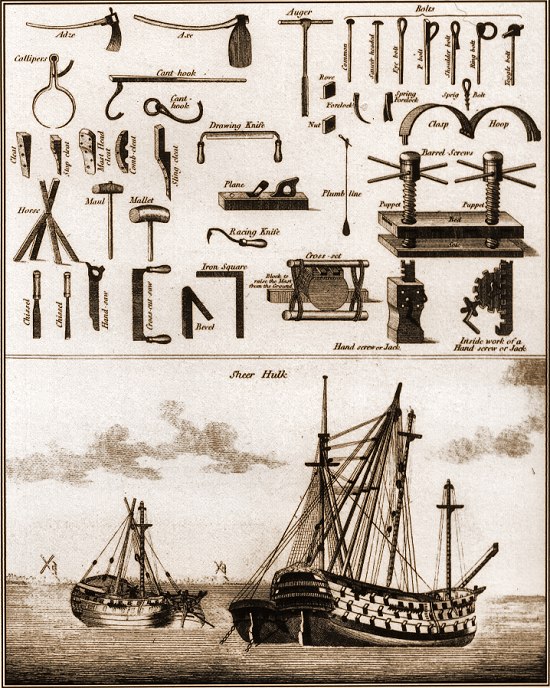Ship building tools in the Age of Sail
Pointing the mouse over a Display Image label will display the image. |
||
| Shipbuilding Tools
|
||

|
||
Adze: A shipwright's tool, similar to an axe, used for shaping and dressing wood. It was different from an axe in that it had a long slender curved blade set at a right angle to the handle. *** |
||
|
Auger: A shipwright's tool for drilling holes in timbers. |
||
Axe: A shipwright's tool, the shipwright's axe came in a variety of shapes. The shape of the blade depended on the function of the axe. De edge of the blade was either straight or curved, most were curved; The angle of the blade also varied depending whether hard or softer wood was to be cut, a thinner blade was required for the hardest woods. A typical size would be a 1.4" (3.5cm) thick blade, a blade height of 4.1" (10.5cm) and a blade length of 7.4" (19cm). |
||
|
Beetle: A shipbuilding tool. A heavy iron mallet used to drive wedges (irons) into the seams of wooden ships to open them before caulking. |
||
Caulking Mallet: A shipbuilding tool. An iron or wooden mallet (heavy hammer) used to strike a variety of irons, to open and close seams or to fill seams with oakum. *** |
||
Drawing Knife: A shipbuilding tool with a long and slender sharp-edged blade and two handles, one on each end. It was used to draw material away from the piece to be worked on. *** |
||
Horsing Iron: A shipbuilding tool. A caulking iron used when caulking deck seams. *** |
||
Jerry Iron: A shipbuilding tool. An iron tool used for extracting old oakum from seams. Also called meaking iron. *** |
||
|
Nog: A wooden treenail or pin used in shipbuilding. |
||
|
Oker: Red chalk used by shipwrights to mark timber. |
||
Pitch Ladle: An iron ladle used to pour boiling tar into deck seams to seal and make them watertight. *** |
||
|
Racing Knife A shipwright's tool to mark or race the shape to be cut, often to mark or score the shape of a mould onto a piece of timber. |
||
Reeming Iron: A shipbuilding tool. An iron wedge used to open up seams before caulking. *** |
||
Sail Iron: A sailmaking tool. A wooden iron used to close and flatten the seams and stitching of sails. *** |
||
Slide Rule: A shipwright's measuring tool. Late 19th century slide rule courtesy of Carle Bross Click here for a much larger version. *** |
||
|
Wrung Staff: A shipwright's tool used in attaching the hull planking to the frame timbers. It consisted of a sturdy wooden rod, tapered at both ends. Also called wrain stave. Was used together with ring bolts called wrung- or wrain-bolts, to force the planks closer to their shape and the ship's frame. |
||
Concept, content & Design: The Art of Age of Sail